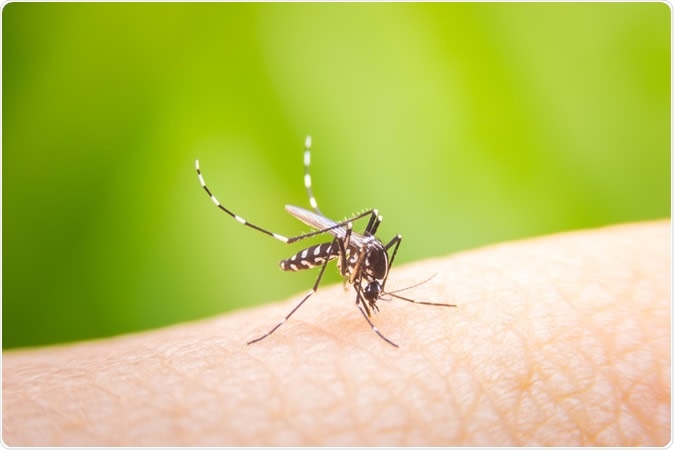A large-scale drive against mosquitoes in Sri Lanka reduced the incidence of dengue fever and saved a lot of money as well, according to a study led by the New York University of Global Public Health.
Dengue is a mosquito-borne viral illness which results in fever, body pain, rashes and sometimes life-threatening complications. In such cases, hospitalization and intensive care are mandatory, which burdens the public health expenditure in dengue-rife areas such as south Asia.

Aedes aegypti mosquito on skin human. Image Credit: khlungcenter / Shutterstock
The illness has plagued Sri Lanka over the past few years with over 55,000 being reported in 2016. Initially, efforts were made to bring out a dengue vaccine to reduce the disease incidence. However, the adverse effects associated with the vaccine have prevented its wide deployment. This has directed preventive efforts towards controlling the mosquito population instead.
To do this, Sri Lanka pioneered a public health partnership initiative – reducing the mosquito populations by a team effort between the Ministry of Health, the military, and the police.
The focus was on door-to-door surveillance over large areas to detect and eradicate mosquito breeding sites. Each team contained public health personnel, as well as representatives from the police and the military. At least 50 sites were inspected each day, with the team looking for stagnant water in containers, and other likely spots. This was in addition to the mosquito control measures already in place, such as larvicide and insecticide application.
The current research looked at how much impact the intervention had between June 2014 and December 2016. The area chosen for the research was an urban part of western Sri Lanka with high dengue endemicity. The parameters examined included symptomatic dengue rates before and after the intervention and the program cost, as well as the cost-benefit analysis. Confounding factors like climate changes were adjusted for while analyzing the data.
The aim of the study was to provide a source of information for public health planners and policymakers to determine which interventions yielded the greatest positive impact at lowest cost, especially in regions and cultures with limited resource supply.
The study concluded that the mosquito control program affected mosquito breeding in the target population, reducing the number of larva, as well as a 57% drop in the rate of dengue. This means that the intervention carried out over 31 months prevented almost 2200 cases of dengue.
The total cost of the mosquito population control initiative was $271,615. Of this, about 90% was used to pay the costs of the staff utilized in the program. This is not surprising, since the intervention relied completely on house-to-house visits and inspections, and manual removal of all locations where mosquitoes were likely to breed.
But was this a cost-effective way to do this? To find out, the researchers determined the costs in three possible situations, with respect to how many dengue cases required hospitalization. In the first, moderate hospitalization was envisaged, which means 50% of dengue cases. In the second, low hospitalization was premised, at 25%. The third situation looked at high hospitalization rates, at 75%.
In the moderate hospitalization setting, the financial savings that resulted from fewer dengue cases because of the mosquito control initiative amounted to $291,990. This more than compensated for the costs of the program, leaving an excess of $20,247. Moreover, the researchers estimated that 176 disability-adjusted life-years (DALY) were prevented over the period of the study, at $98 saved for each DALY.
When a high-hospitalization scenario was examined, the program was found to be cost-effective in this setting as well, saving $512 per DALY. But with the low-hospitalization scenario, one set of calculations led to its being considered cost-effective, but not others.
“"Even if a safe dengue vaccine becomes available in the future, mosquito control is likely to remain a key complementary strategy to curtail the continued spread and intensification of dengue,” commented Yesim Tozan, senior author.
In conclusion, dengue-affected areas could reap significant benefits from efforts directed at mosquito control if carried out with careful planning, resolution and vigor.
Lead author Prasad Liyanage said: “Our study suggests that communities affected by dengue can benefit from investments in mosquito control if interventions are implemented rigorously and coordinated across sectors. By doing so, it is possible to reduce the disease and economic burden of dengue.”
The study was published in the journal The Lancet Planetary Health in May 2019.
Source:
Liyanage P. et al., (2019). Evaluation of intensified dengue control measures with interrupted time series analysis in the Panadura Medical Officer of Health division in Sri Lanka: a case study and cost-effectiveness analysis. The Lancet Planetary Health. https://doi.org/10.1016/S2542-5196(19)30057-9